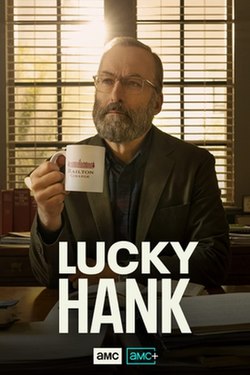A Review of Lucky Hank: O, the Humanities!
by John Kendall Hawkins
"The scariest thought in the world is that someday I'll wake up and realize I've been sleepwalking through my life: underappreciating the people I love, making the same hurtful mistakes over and over, a slave to neuroses, fear, and the habitual."
~ George Saunders
This past February a New Yorker article sounded a solemn knell for what many of us have suspected for quite awhile: The humanities are dead: long live the humanities. The title of Nathan Heller's article this past February is "The End of the English Major: Enrollment in the humanities is in free fall at colleges around the country." The piece also includes History in the car crash. What happened?
Money happened, says Heller. Tuition has gone up. A middle class that once could comfortably afford a "decent college education" for its kids is feeling what the working class has suffered through for quite some time now, an erosion of confidence in the System, along with the deflation of their material net worth. Now that the buffer class is feeling the pinch, the erosion story becomes worthy of the New Yorker's attention. Really, part of the problem.
Heller references the tale of Justin Kovach, a senior at Arizona State University, who had a natural affinity for classics of literature -- especially Don Quixote, which he found "very funny" -- but who, instead, opts to study a STEM (science, technology, engineering, mathematics) subject. His decision is based on economics over personal fulfillment. Heller explains:
Kovach will graduate with some thirty thousand dollars in debt, a burden that influenced his choice of a degree. For decades now, the cost of education has increased over all ahead of inflation. One theory has been that this pressure, plus the growing precariousness of the middle class, has played a role in driving students like him toward hard-skill majors. (English majors, on average, carry less debt than students in other fields, but they take longer to pay it down.)
I know this scene all too well. I studied at a state university and wondered, more and more as graduation loomed, what I would do with my English and Philosophy double-major, and how I would pay back the student loans which became due a year after graduation. Eventually, though I wanted to be a writer, I pursued a graduate degree in education, thinking like a lot of such people do, that I'd find time and the money as a teacher to pay back my loans and find time to write my novels and poetry.
That was 40 years ago. So, the problem is not new. And while the middle class is gasping at its erosion and the illusion of safety that fed it, the student debt keeps rising. Last year, the estimated outstanding student debt in the US was $1.75 trillion, with 92% of such loans owed to the federal government, according to Forbes magazine.
Heller points beyond our parochial America First shores to note that the drop in Humanities studies appears to be a global phenomenon. We are not alone is cold comfort. Hellers writes,
During the past decade, the study of English and history at the collegiate level has fallen by a full third. Humanities enrollment in the United States has declined over all by seventeen per cent, Townsend found. What's going on? The trend mirrors a global one; four-fifths of countries in the Organization for Economic Coöperation reported falling humanities enrollments in the past decade. But that brings little comfort to American scholars, who have begun to wonder what it might mean to graduate a college generation with less education in the human past than any that has come before.
Welcome to the technological singularity, I say. When we've dropped humanities all-together we'll know the merge is complete.
In response to Heller's piece, shortly afterward Sarah Blackwood wrote a "Letter from an English Department on the Brink" for the NYRB. She argues that the economics of education and the contemporary choice foisted upon many students between personal fulfillment and practical necessity, between, say, writing, or teaching it and not doing much writing, is not the complete picture. The subtitle of Blackwood's piece says it all, "At the English department I chair, our major has grown by more than 40 percent in the last two years. We are being driven to the edge of extinction anyway." For Blackwood, the real issue is that the value of humanities is lost. She writes,
In their interviews with Heller, English faculty and administrators discuss an array of real issues with an alarming lack of coherence. They try to place blame both for what is happening at their own institutions and for what they consider broader national concerns"Much more to the point are Heller's interviews with students, who explain the fundamental problem quite clearly: universities do not value the humanities.
(Note: You can view every article as one long page if you sign up as an Advocate Member, or higher).





